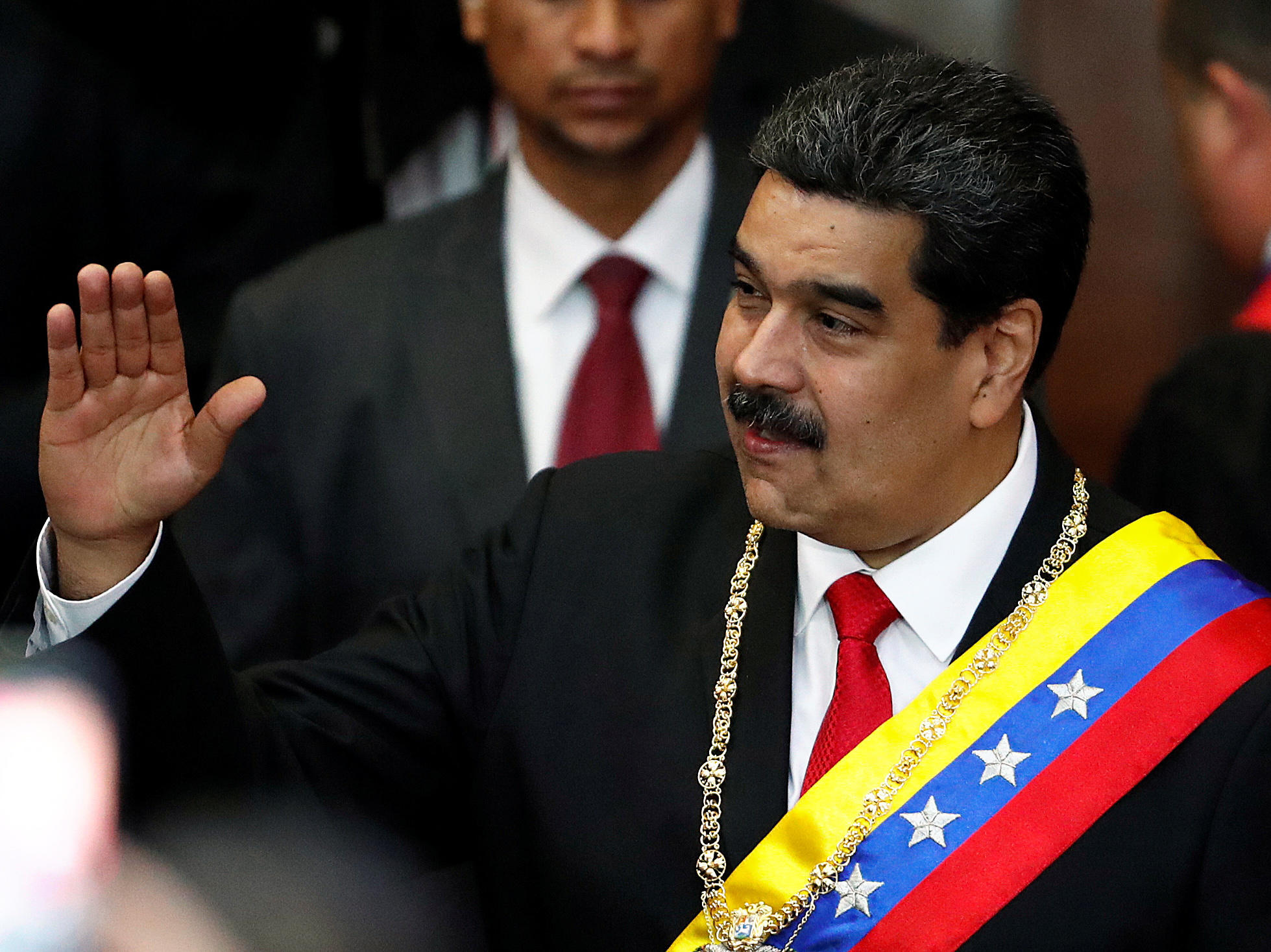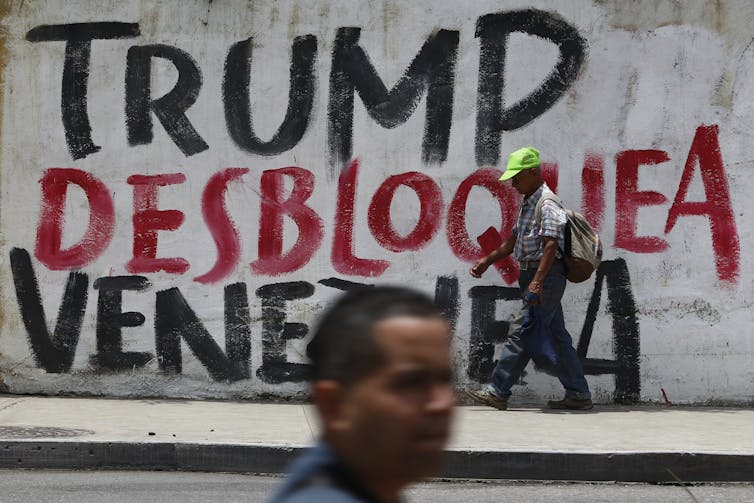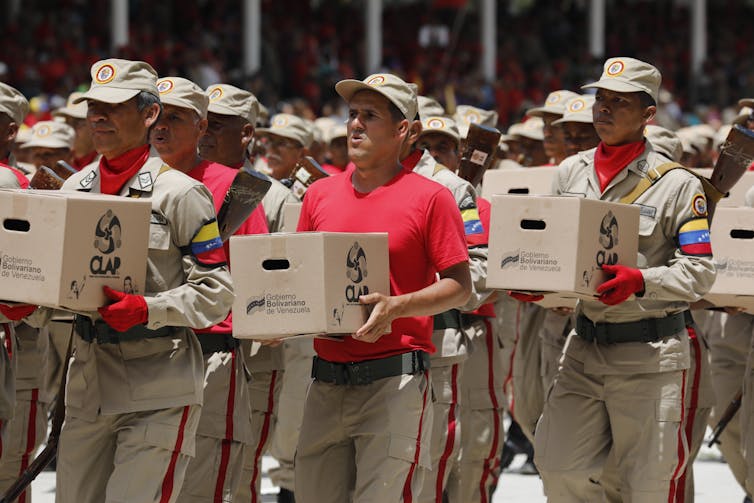
The U.S. has announced an economic embargo on Venezuela, intended to put an end to President Nicolás Maduro’s authoritarian regime.
In an Aug. 5 executive order, President Donald Trump said that the tough new sanctions – which target any company or individual outside of Venezuela doing business directly or indirectly with Maduro’s government – were a response to the Maduro regime’s “continued usurpation of power” and “human rights abuses.”
All Venezuelan government assets in the United States are also now frozen.
The new measures represent a significant escalation from previous sanctions, which mainly targeted government officials and some key industries such as oil and gas, gold and finance.
But my analysis of Venezuela’s political and economic crisis suggests that an embargo alone will not provoke Maduro’s ouster. Here are five reasons why.
1. Venezuela’s economy is already broken
Embargos are a foreign policy tool meant to pressure rogue governments into changing their ways by cutting off their cash flow.
It’s too late for that in Venezuela.
After years of mismanagement and corruption by the Maduro government, Venezuela’s economy is in shambles. The GDP has contracted by more than 15% every year since 2016. Hyperinflation hit 10 million percent in 2019.
Maduro’s cash-strapped government defaulted on its dollar-based bonds in 2017. This year it has failed to make payments on US$1.85 billion that Deutsche Bank and Citigroup loaned Venezuela using the regime’s gold as collateral. Venezuela’s government is nearly bankrupt.
But since this economic decline has happened gradually, beginning in 2014, wealthy Venezuelans – especially corrupt government officials – have already put their money overseas, primarily in European markets. For example, Venezuelans own some 7,000 luxury apartments in Madrid, according to The New York Times.
American sanctions just can’t hurt Venezuela’s ruling class the way they might have several years ago.
2. The embargo leaves some cash flows untouched
Trump’s harsh new sanctions on Venezuela are not a full trade embargo like the Cuba embargo, which has almost totally isolated the island from world markets since 1962.
Imports and exports with the private sector – a still sizable market despite Maduro’s socialist policies – will continue to flow freely, as will remittances from Venezuelans living abroad.
These two income sources both come in dollars, which is far more stable and valuable than the local currency. Combined, they can keep the ailing Venezuelan economy afloat for some time.
An incomplete embargo, in other words, will not provoke complete economic collapse.

3. The poor, not the regime, will be hurt the most
Venezuelans with access to dollars – through remittances or savings squirreled away before the crisis – are surviving this crisis. They can afford food, medicine and gasoline, and buy other goods to barter.
But most Venezuelans today are desperately poor. According to the United Nations, 90% of people there live in poverty. That’s double what it was in 2014.
The Venezuelan minimum wage of roughly $7 per month is not enough to cover a family’s basic needs. As a result, malnutrition is spreading. Last year, Venezuelans reported losing an average of 25 pounds, and two-thirds said they go to bed hungry.
The majority of Venezuelans rely on the government to eat. Its monthly delivery of heavily subsidized food and basic goods known as “CLAP” is a lifeline to the poor. If the government runs out of money, poor people will feel it the most – not the government officials and other Venezuelans with access to dollars.

4. China and Russia still support Venezuela
Maduro has few international allies. When the Trump administration led efforts earlier this year to recognize opposition leader Juan Guaidó as the legitimate president of Venezuela, 60 countries joined it.
But China and Russia continue to be the Venezuela’s most powerful international boosters and have bailed out Maduro by giving his government massive loans in the past. Both have vetoed every U.S. effort to pass resolutions against Maduro’s government within the United Nations.
China has exploited Venezuela’s vast natural resources for profit. Russia has made the South American nation a strategic geopolitical partner in the Western Hemisphere, a key ally in its efforts to undermine American influence.
Neither of the two countries are likely to comply with an economic embargo to Venezuela. Analysts expect them to continue buying oil, gold and other valuable commodities from Maduro’s regime, providing much-needed cash to his government.
5. Remember Cuba?
Embargoes rarely produce regime change of the sort Trump seeks in Venezuela.
Just consider Cuba, which this year celebrated the 66th anniversary of its communist revolution – 57 years after the Kennedy government imposed a trade embargo against it. The Cuba embargo didn’t end the Castro regime; it fueled anti-American sentiment, handing the Castros an easy scapegoat for all the country’s problems – thereby improving the government’s own popularity.
An embargo will almost surely do the same in Venezuela. Trump has given Maduro even more ammunition to blame the U.S. for his country’s economic woes.
Maduro has been doing that for years anyway. Now, he won’t be totally wrong.![]()
Marco Aponte-Moreno, Associate Professor of Global Business and Board Member of the Institute for Latino and Latin American Studies, St Mary’s College of California
This article is republished from The Conversation under a Creative Commons license.


